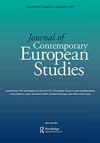政治的语言:欧盟的多语言政策制定
IF 1.8
3区 社会学
Q1 AREA STUDIES
引用次数: 3
摘要
本文章由计算机程序翻译,如有差异,请以英文原文为准。
The language(s) of politics: Multilingual policy-making in the European Union
Eurosceptic opposition is focused on scrutinising the EU institutions and channelling citizens’ discontent. On the other hand, the existence of populist actors within the EP means a growing challenge to political groups regarding EU values. On that matter, special emphasis should be put on the chapter from Morijn (chapter 9) and the chapter from Kantola (chapter 10). In both chapters, the authors proved disappointed with how political groups have protected EU values. In Morijn’s chapter, the author has contended that violations of EU values are, in a certain manner, protected by large and mainstream political groups. In the same line of thought, Kantola has argued that nearly one-third of MEPs oppose gender equality. However, for Kantola, the most significant was identifying an impressive number of political groups that oppose equality gender, when EP acts as one of the promoters of such values. It may well be asserted that despite ‘democratic legitimacy’ becoming an issue of the past, the challenges to the EU values may well be an issue of the future, especially considering the consequences of the pandemic and war. All in all, and as acknowledged by Ahrens, Elomäki and Kantola, all chapters could be expanded into new research with further empirical data. An idea would be particularly interesting if it included issues like cooperation and competition among political groups or the impact of COVID-19 and Ukraine’s crisis, for example. There is a need for further research regarding the challenges and new opportunities that radical right populist actors put into the EP. The authors seem to be in a particularly good position to go in-depth with such a matter.
求助全文
通过发布文献求助,成功后即可免费获取论文全文。
去求助
来源期刊

Journal of Contemporary European Studies
Multiple-
CiteScore
2.70
自引率
7.70%
发文量
84
期刊介绍:
The Journal of Contemporary European Studies (previously Journal of European Area Studies) seeks to provide a forum for interdisciplinary debate about the theory and practice of area studies as well as for empirical studies of European societies, politics and cultures. The central area focus of the journal is European in its broadest geographical definition. However, the examination of European "areas" and themes are enhanced as a matter of editorial policy by non-European perspectives. The Journal intends to attract the interest of both cross-national and single-country specialists in European studies and to counteract the worst features of Eurocentrism with coverage of non-European views on European themes.
 求助内容:
求助内容: 应助结果提醒方式:
应助结果提醒方式:


